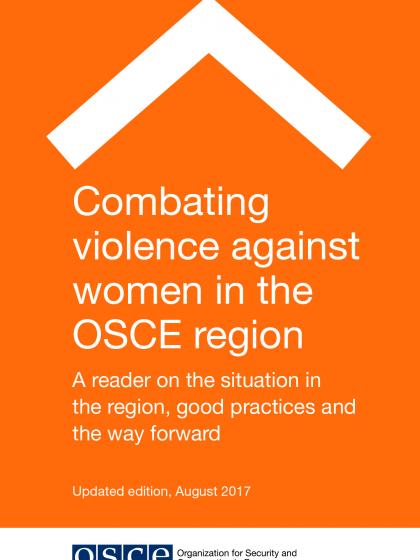Publications
OSCE Economic and Environmental Dimension Commitments Reference Manual 2018
Publishing date: 29 October 2018
Content type: Guide / manual / handbook
Where we are: OSCE Secretariat
What we do: Economic activities, Environmental activities, Good governance
Publisher: Organization for Security and Co-operation in Europe
The publication is the updated version of the Reference Manual of the OSCE Economic and Environmental Dimension Commitments, published in 2014. It contains the text of all Economic and Environmental Dimension related documents adopted at Summit and Ministerial Council levels, as well as relevant Permanent Council decisions.
HCNM at 25: Personal Reflections of the High Commissioners
Publishing date: 13 November 2018
Content type: Book
Where we are: OSCE High Commissioner on National Minorities
Publisher: Organization for Security and Co-operation in Europe
This publication, prepared by the Centre for OSCE Research (CORE) and the OSCE High Commissioner on National Minorities, was released in November 2018 to mark the 25th anniversary of the HCNM. It contains personal reflections of the five consecutive High Commissioners about the work and the role of the HCNM.
Guidelines on the Legal Personality of Religious or Belief Communities
Publishing date: 4 February 2015
Content type: Guide / manual / handbook
Where we are: OSCE Office for Democratic Institutions and Human Rights
What we do: Human rights
Publisher: Organization for Security and Co-operation in Europe
The purpose of these Guidelines is to ensure that those involved in drafting and applying legislation in the area of the freedom of religion or belief, including civil society representatives, have at their disposal a benchmark document containing minimum international standards in the area of recognition of religious or belief communities. The document does not seek to challenge established agreements between states and religious or belief communities but, rather, to delineate the legal framework that would ensure that communities wishing to do so have a fair opportunity to be granted legal personality, and that the criteria established are applied in a non-discriminatory manner. This document elaborates on the issues of registration and recognition of religious and belief organizations, and supplements section II.F on “Laws governing registration of religious/belief organizations” of the 2004 Guidelines. The 2004 Guidelines do, however, remain valid in their entirety.
Cross-Border Mobility in the OSCE Region (2011–2015)
Publishing date: 1 February 2018
Collections: Archive of migration-related resources
Content type: Brochure
Where we are: OSCE Office for Democratic Institutions and Human Rights
What we do: Democratization, Migration
Publisher: Organization for Security and Co-operation in Europe
Using the information published in the ODIHR Baseline Study on Cross-Border Mobility in The OSCE Region (2014) as a starting point, this update provides a statistical overview of the trends in cross-border mobility in the OSCE region in the period between 2011 and 2015.
Combating violence against women in the OSCE region
Publishing date: 6 December 2017
Collections: #SOFJO Resource Guide
Content type: Study / report
Where we are: OSCE Secretariat
What we do: Gender equality
Publisher: Organization for Security and Co-operation in Europe
The Graz Recommendations on Access to Justice and National Minorities
Publishing date: 14 November 2017
Collections: Thematic Recommendations and Guidelines
Content type: Book
Where we are: OSCE High Commissioner on National Minorities
Publisher: Organization for Security and Co-operation in Europe
A set of OSCE High Commissioner on National Minorities Recommendations on access to justice and national minorities
Youth Progress Index 2017
Publishing date: 16 October 2018
Content type: Study / report
Where we are: OSCE Office for Democratic Institutions and Human Rights
What we do: Democratization
Publisher: Organization for Security and Co-operation in Europe
This Youth Progress Index (YPI) report aims to present a roadmap – a useful and practical tool – that can help all youth stakeholders, from young people and youth-led organizations to policymakers and the business community, prioritize their respective policy and investment decisions, assess where resources should be focused, and implement policies and programs that will drive faster and more sustainable progress for young people. The YPI is one of the first tools developed to explore the status of youth, independent of economic indicators. The YPI draws on reliable, relevant data to give each country a score on how effectively they meet the elements of the Social Progress Index Framework: Basic Human Needs, Foundations of Wellbeing, and Opportunity.
OSCE/ODIHR Annual Report 2014
Publishing date: 11 August 2015
Collections: ODIHR Annual Reports
Content type: Annual report
Where we are: OSCE Office for Democratic Institutions and Human Rights
Publisher: Organization for Security and Co-operation in Europe
Disability Hate Crime
Publishing date: 19 December 2016
Collections: Hate Crime Factsheets
Content type: Factsheet
Where we are: OSCE Office for Democratic Institutions and Human Rights
What we do: Tolerance and non-discrimination
Publisher: Organization for Security and Co-operation in Europe
People with disabilities are regularly the targets of hate crimes. These crimes remain widely unknown, hidden and misunderstood. Recognizing the magnitude of the problem is the first step in effectively countering these hate crimes. This factsheet provides information on how to recognize and report hate crimes against people with disabilities. This is the first publication in a series that highlights how hate crime affects different groups.
Gender Equality Review Conference Report
Publishing date: 12 April 2018
Content type: Study / report
Where we are: OSCE Chairmanship, OSCE Office for Democratic Institutions and Human Rights, OSCE Secretariat
What we do: Gender equality
Publisher: Organization for Security and Co-operation in Europe
This report presents the proceedings and outcomes of the second Gender Equality Review Conference held in June, 2017. The report shows an example of how political will and leadership can strengthen the awareness and understanding of the important link between gender equality and comprehensive security.










